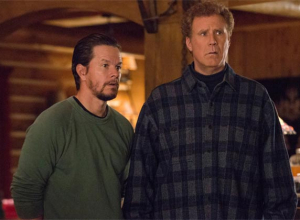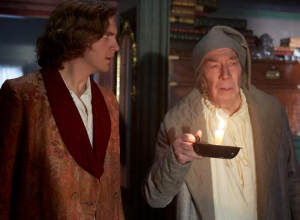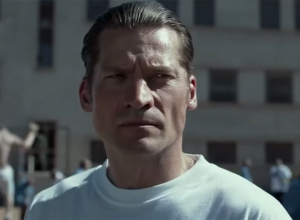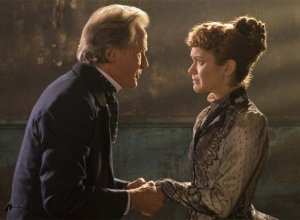Intolerance Review
By David Bezanson
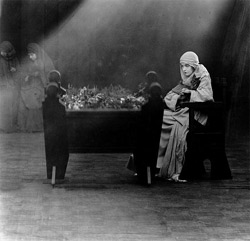
Intolerance was Griffith's follow-up to The Birth of a Nation, the first important commercial motion picture. Nation cost $100,000 and made ten times that, and was praised by President Woodrow Wilson, among others. But the movie's endorsements of segregation and the Ku Klux Klan received some criticism (go figure). Like so many egoistic auteurs after him, Griffith took the criticism badly while letting the praise go to his head. Griffith blew a Titanic budget (for the time) making Intolerance, a self-indulgent, confusing ten reels about man's inhumanity to his fellow man. If Birth of a Nation was the first blockbuster (and the birth of the movie industry, in fact), Intolerance was the first Ishtar -- i.e., the first reminder that when it comes to making art or even entertaining the public, Hollywood doesn't have all the answers.
The film is a historical melodrama that splices together four separate stories that supposedly share a common theme. The plot that consumes the most screen time is the "modern" tale of two young lovers (Mae Marsh and Robert Herron) in a steel mill town tyrannized by the upper class. Intermixed with that is a strange story about a tomboy-turned-heroine (Constance Talmadge) who tries to stop the conquest of Babylon by the Persians, circa 500 B.C. The other two plots are afterthoughts: a confusing series of scenes set during the St. Bartholomew's Day Massacre (Paris in the 1570s), and a sketchy but moving depiction of the life of Christ which does not get much screen time. In all of these stories, the powerful (rich people or priests) oppress the less powerful, so the unifying theme is sort of a cartoonish depiction of injustice, not really intolerance. The plots ultimately degenerate into exciting melodrama -- the end is a seat-hanger -- but still, for a movie about religious intolerance, there are too many preachy moments. Since there is no sound, of course, the morals are delivered in cryptic and pretentious on-screen messages. The public of 1916 obviously decided they didn't need any of it and stayed away. Intolerance was a huge flop.
Though Griffith's career never recovered, Hollywood did, and for several decades it stayed grounded in solid entertainment values (and even made many suave and historically accurate epics, such as Gone With the Wind, that hold up today). But every "great" director since the 1960s (and many who aren't that great) has made at least one bloated blockbuster that left audiences scratching their heads, and Intolerance pointed the way.
Surprisingly, as a visual spectacle this very old film stands up well. The number of men, women, children, livestock, trains, and chariots put in to stage the film's myriad crowd scenes, battles, millworkers' strikes, Babylonian bacchanals, etc. is mind-boggling. The sets are more elaborate than anything that would be attempted again by Hollywood until the 1960s. Even the most bored viewer will ask at times, "How the hell did Griffith do that?" And the next inevitable question is, "Why?"
The fast-paced final reel redeems the movie, even if the point is impossible to understand. And perhaps the best reason to watch Griffith's films is the opportunity to see where Hollywood came from and to see modern camera angles and devices used for the first time.
Warning: the newly released video version includes the dubbed organ music that accompanied the silent film, which modern audiences will find intolerable. Watch with the sound off.
Intolerant.
Facts and Figures
Year: 1916
Run time: 11 mins
In Theaters: Wednesday 8th August 2007
Budget: $2M
Production compaines: Triangle Film Corporation, Wark Producing Corp.
Reviews
Contactmusic.com: 3 / 5
IMDB: 7.2 / 10
Cast & Crew
Director: D. W. Griffith
Producer: D.W. Griffith
Screenwriter: Tod Browning, D.W. Griffith
Starring: Lillian Gish as The Woman Who Rocks the Cradle, Mae Marsh as The Dear One (Modern Story), Robert Harron as The Boy (Modern Story), F.A. Turner as The Girl's Father (Modern Story), Sam De Grasse as Arthur Jenkins (Modern Story), Vera Lewis as Mary T. Jenkins (Modern Story), Lillian Langdon as Mary, the Mother (Judean Story), Olga Grey as Mary Magdalene (Judean Story), Erich von Ritzau as First Pharisee (Judean Story), Bessie Love as The Bride of Cana (Judean Story), Margery Wilson as Brown Eyes (French Story), Eugene Pallette as Prosper Latour (French Story), Spottiswoode Aitken as Brown Eyes' Father (French Story), Ruth Handforth as Brown Eyes' Mother (French Story), Elmer Clifton as The Rhapsode (Babylonian Story), Alfred Paget as Prince Belshazzar (Babylonian Story), Seena Owen as Princess Beloved (Attarea) (Babylonian Story), Carl Stockdale as King Nabonidus (Babylonian Story)
Also starring: Robert Herron, Constance Talmadge, Fred Turner, Howard Gaye, Walter Long, Tod Browning

